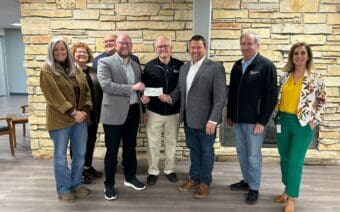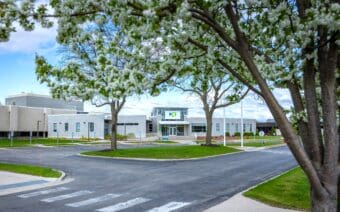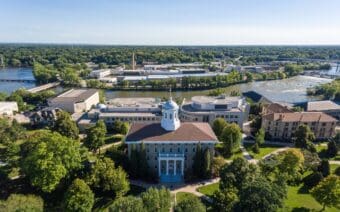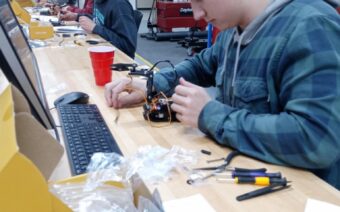
April 5, 2023
OSHKOSH – Northeast Wisconsin is made up of a variety of movers and shakers working toward making their cities and counties a better place.
Dr. Mai See Thao, the first Hmong studies director at the University of Oshkosh (UWO), is one of these movers and shakers looking to make a difference.
Recently named an Emerging Scholar by Diverse: Issues in Education, Thao said she is both proud and thankful for what she’s accomplished with the Hmong studies Program at UWO in three years and doesn’t plan on stopping.
Inaugural Hmong Studies director
Thao said her position as the university’s first Hmong Studies director came to be through a consistent push from Hmong students wanting to see more representation in the curriculum.
“I think the students and multicultural student organizations were in conversation with the chancellor (Andrew Leavitt) to get more Hmong studies – and I think Latinx studies and gender studies – programming,” she said. “Then they created the director position.”
At the time, Thao said she was working as a postdoc at the Medical College of Wisconsin.
“I’m a medical anthropologist by training,” she said. “My time at the Medical College was about building leadership. I was getting leadership training and community-engaged training.”
When she took the director position at UWO, Thao said the experience she had at the Medical College of Wisconsin allowed her to hit the ground running.
“I think those skill sets I already brought to the table are important to building Hmong Studies the way I’ve built it,” she said.
Thao said students who enroll in courses with the Hmong Studies program can expect the classes to be taught from a critical race and ethnic studies lens.
“Through the Hmong experience, (we look at) how we think about larger issues or conversations around U.S. militarism, globally and the effects of that locally right within our own land,” she said. “And then within the U.S., thinking about the impacts of race and racialization, poverty and so much more. So (having) these larger sociological and human humanistic conversations through Hmong studies.”
Thao said courses focus on Hmong migration, what happened during The Secret War, resettlement in the U.S., global health studies and what it means to be a refugee.

Dr. Mai See Thao
As a medical anthropologist, she said she also uses a Hmong lens to critique narratives around trauma with her students.
“We think about the potential political engagement when you think of trauma and collective trauma – how might we reimagine political engagement or a different way of engaging the past in order to build better futures,” she said.
Program expansion
Within the last three years of being the Hmong Studies director, Thao said the program has expanded.
“When I first came here, I was a one-person program,” she said. “After I had a baby during the COVID-19 pandemic… it made it apparent to the institution that if I go on FMLA (Family and Medical Leave Act), who will cover me?”
Thao said this sparked conversations about the sustainability of support for Hmong studies – “because it’s not enough to say we want to program.”
“Who do we have in place to support the program?” she said. “What is the structure that’s going to meet the program? That’s been a supportive conversation I’ve been able to have with our administration.”
Thao said she was thankful to the university for allowing her to search for more Hmong studies faculty in order to better support the program.
“We successfully hired two Hmong studies faculty, (which is typically unheard of),” she said. “It’s exciting that at little UW-Oshkosh we’re making so much history.”
One of the new faculty members, Thao said, is a historian, and the other is an education anthropologist.
“The program is dynamic so it can equip a diverse student body in terms of not just makeup, but also majors,” she said. “So, people will be ready to work in communities of color and refugee populations, and – if they stay in the area – definitely work with the Hmong community and in different career spaces.”
The director also said the program was recently awarded an NSF (National Science Foundation) grant award with its partner at Madison to look at STEM (science, technology, engineering and mathematics) inequality for Hmong students in STEM majors.
Over the last three years, Thao said she’s “been able to string together about $500,000” in grant funding.
An Emerging Scholar
Thao said being named an Emerging Scholar by Diverse: Issues in Higher Education was “really nice.”
“I think sometimes, when you do this work of diversity and equity and (are) always having to talk about issues of race and power, sometimes it feels like it’s not as valued or it’s not as legitimated because sometimes it’s not compensated for,” she said. “The awards are nice because then it is able to highlight (things) like, ‘Oh, you’re actually doing good work and (it) has a big impact on people.”
Thao said she was nominated by the interim Diversity Officer at the time, Alicia Johnson.
In Thao’s article with Diverse: Issues in Higher Education, Johnson said Thao is “someone who puts a lot of heart into what she does.”
“I think she has had a profound impact on our institution as well as the broader community…,” Johnson said of Thao. “She’s helped create a strong foundation for Hmong studies, as well as grow the program along with other ethnic studies concentrations.”
A growing future
Reflecting on the future, both with the Hmong studies program and other projects, Thao said several things are in the works.
“The growth of the (Hmong studies) program is to think, ‘How do we take the things we learn in the ivory tower and apply it into the real world?’” she said. “Because for me, work… needs to be useful for everyday life… so the program is looking at building more courses in collaboration with the community, not so that students also learn from the community, but also that the community gains something through that educational setting.”
For example, one class Thao said they’re working toward looks at the Hmong relationship with the land, and how the Hmong population has been an important staple in the community’s farmer’s market economy.
Thao said she is also currently working on a traveling, community-based exhibit called “Cia Siab (Hope) in Wisconsin: a HMoob (Hmong) Story,” which is set to launch in 2025.

Dr. Mai See Thao, Hmong studies director, said she is working on a traveling, community-based exhibit that is set to launch in 2025. Photo Courtesy of Mai See Thao
She said she applied for the National Endowment for the Humanities, with a plan to create an exhibit in collaboration with community members – who she now said she considers “community curators” – that is focused on historical trauma and healing.
“For me, historical trauma isn’t just trauma from the war, but it’s also trauma that is passed down intergenerationally, (and is) also structured in the ways we commemorate different kinds of war,” she said. “In the U.S., we don’t really think about The Secret War – what most people did or what they’ve experienced. Some of those kinds of silences and absence, even in the national narrative, reinforce more historical trauma.”
Thao said the bulk of the work she’s doing for the exhibit includes gathering artifacts and stories.
She also said it’s important to note the project is not to say the Hmong are a traumatized population, but rather to name historical trauma.
“It’s also to say how they’re resilient, and how they’ve continued to survive and love and do human things,” she said. “So for me, this is a public humanities project.”
Thao said as a medical anthropologist, for her, the project is also a health intervention.
“To say, ‘This is what people are going through, but this is also the way in which people are powerful and doing amazing things all the time.’”
More information on the exhibit will be released as it gets closer to launching.
 Farm-fresh meats raised responsibly at Huhta Homestead
Farm-fresh meats raised responsibly at Huhta Homestead ‘It’s never too late to follow your dreams’
‘It’s never too late to follow your dreams’








